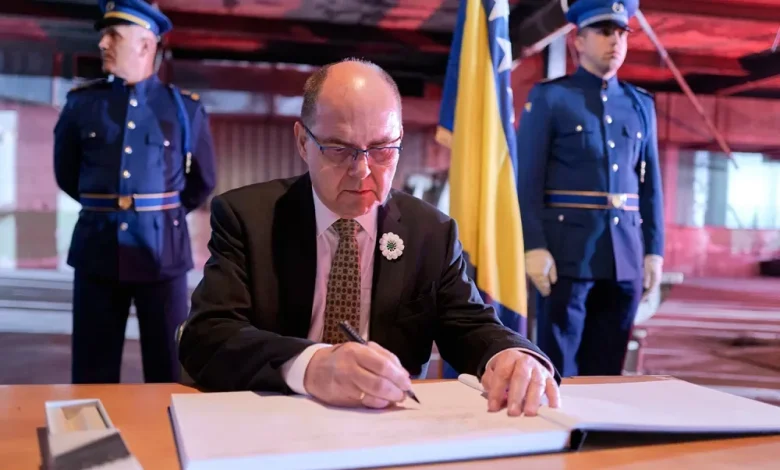The Dayton Accords Has Made Bosnia a Forever Protectorate

The end of the Bosnian War—which killed 100,000 people; displaced millions; and culminated in Europe’s deadliest atrocity since World War II, the Srebrenica genocide—marks its 30th anniversary this month. The peace accords agreed upon in Dayton have held Bosnia and Herzegovina together for the past three decades, an impressive achievement—one that can serve as a model for peacekeepers elsewhere, including the Trump administration’s 20-point peace plan for Gaza.
The scars of war are indeed hard to see in Bosnia today. Yet, in some important ways, Dayton is itself a scar that has never entirely healed. One provision of the plan in particular—the establishment of a high representative appointed by the international community—is increasingly viewed as a symbol of the country’s inability to move past the war.
Christian Schmidt, the international community’s current high representative in Bosnia, has come under increasingly severe scrutiny amid serious doubts about the validity of his appointment—even as the rest of Europe largely fails to acknowledge the problem. Schmidt has become the personification of Bosnia’s extended state of arrested development, abetted by the rest of the continent.
The 1995 peace agreement had many moving parts. Power was to be shared among the country’s three constituent peoples through a byzantine web of quotas, vetoes, and rotating presidencies. The design prevented domination by any one group, but it also condemned the state to paralysis. And two foreign officials oversaw this massive operation: the U.S. commander of the 60,000-strong, NATO-led “Implementation Force,” and the high representative, a European official charged with coordinating the civilian aspects of the peace accord.
Three men in suits seated at a table with papers on it. Six men in suits stand clapping behind them.
Serbian President Slobodan Milosevic, Croat President Franjo Tudjman, and Bosnian President Alija Izetbegovic sit in front of their copies of the Dayton Peace Agreement in Paris in 1995 as other world leaders applaud the historic agreement. Peter Turnley/Corbis/VCG via Getty Images
Thirty years later, their successors still reside in Sarajevo. But while the senior military commander is now a Romanian major general commanding barely more than a thousand lightly armed troops, his civilian counterpart’s powers have grown beyond recognition. Over the past three years, Schmidt, a former German agriculture minister, has been the eighth man—no woman has ever been appointed to this role—to serve as high representative. He has rewritten the election law, suspended constitutions, engineered the dismissal of a president, and amended the law to make disobedience toward his decisions a criminal offence.
The context is a long-running struggle over the balance of power between the state and the two entities, in which high representatives have intervened repeatedly on the side of the central government in Sarajevo. Much of the controversy turns on state property—including Bosnia’s wealth of natural resources—whose status remains unsettled. Republika Srpska, one of the two political entities comprising Bosnia and Herzegovina, and its president, Milorad Dodik, have escalated the conflict, laying unilateral claim to that property and defying rulings of the state Constitutional Court. In response, Schmidt annulled their laws and, in July, cut off public funding to Dodik’s party.
This is more than a personal conflict between one socially awkward German who speaks neither Bosnian nor proper English and a coterie of Balkan politicians. It’s a failure of a whole methodology of conflict resolution, developed in the 1990s and practiced repeatedly since then: impose a political settlement, appoint an international official with sweeping powers to oversee it, and hope for the best.
That model worked well elsewhere, and even in Bosnia during the early postwar years. But it has pitfalls that could easily emerge again, in Gaza or Ukraine, as they have in Bosnia.
A boy stands with his hands outstretched in front of a headstone in a cemetery. Bare trees are seen behind him in a wintry landscape.
A young Muslim boy prays at his brother’s grave in Tuzla on Dec. 25, 1995. Odd Andersen/AFP via Getty Images
Two U.S. troops in camo work atop a tank in a snowy landscape. A Russian soldier with a gun stands nearby.
U.S. Army engineers, alongside a Russian paratrooper (left), deactivate a damaged tank as part of the ongoing NATO peacekeeping mission in Bosnia in 1997. Leif Skoogfors/Getty Images
Many observers, both inside and outside Bosnia, originally expected the peace agreement to fail and the country to fall apart, but only after a decent interval and without much further bloodshed.
The Serb leadership in charge of Republika Srpska, the smaller of Bosnia’s entities, certainly did what it could to make that happen. For the first few years after Dayton, they obstructed implementation at every turn, terrorizing refugees who tried to go home and boycotting the central government. The Dayton constitution was built to work largely by consensus, and the Serbs agreed to almost nothing; the government was paralyzed. As one former high representative admitted, Dayton was “designed to end a war, not to build a state.”
By 1997, Bosnia was slipping apart. Out of desperation, its international overseers staged a quiet coup. The Peace Implementation Council (PIC)—a self-appointed group of about 50 countries and international agencies supporting the reconstruction effort—announced that year that the high representative could exercise governing powers, substituting for the country’s leaders, and could also remove from office anyone he found to be obstructing the peace.
These “Bonn powers,” named after the city in which the council had met, instantly made the high representative the most powerful official in Bosnia and Herzegovina. He quickly expanded them further, claiming the authority to impose legislation and even amend the constitutions of the entities.
The legal basis for this power grab remains contested; one former U.K. ambassador in Sarajevo called it a pure power-play bluff. But it worked spectacularly well. Over the next half-decade, successive high representatives used the Bonn powers to stop the slide toward disintegration and remake Bosnia and Herzegovina on a firm foundation. Backed up by a smaller but still formidable NATO-led peacekeeping force, they overcame Croat and Serb resistance.
It is no exaggeration to say that the early high representatives saved Bosnia and Herzegovina’s territorial integrity. They gave it a common currency, passports and license plates; ended the Serb boycott and fired hundreds of nationalist extremists in all three communities; and shepherded a new generation of leaders to important compromises. Those are enduring achievements, without which today’s peaceful Bosnia is unthinkable.
By the Dayton agreement’s 10th anniversary in 2005, a consensus had developed that the high representatives and their Bonn powers had to be wound down. But the end never came. And then something spectacular happened that still reverberates through the post-Dayton governance architecture.
For 26 years—from 1995 to 2021—every high representative had been appointed in the same two-step process: The PIC designated someone, and the U.N. Security Council (or its presidency) “welcomed” or “agreed to” its choice in a resolution or statement.
Why did this matter? Because the PIC isn’t a formal international organization. It has no legal personality, no founding treaty, no powers on its own. It’s merely an ad hoc group of states that volunteered to help implement the Dayton Accords. Its authority derives entirely from the Security Council, which has the power to override a sovereign country’s own institutions. The two-step appointment process reflected this hierarchy. The PIC would work out the politics and propose a candidate, and the Security Council would provide the legal authorization. One body couldn’t function without the other.
In May 2021, this system broke down with the nomination of the current high representative, Schmidt. Russia, a PIC member, dissented from the decision to nominate him, demanding major concessions such as a commitment not to use the Bonn powers and a guarantee that he would be the last such official. For the first time, the PIC nominated a representative by majority vote rather than unanimously.
Russia, joined by China, then refused to approve the nomination in the Security Council: no welcoming resolution, no presidential statement, no Security Council action at all. When Schmidt appeared to brief the council in 2022, as the Dayton Accords oblige him to, the Russian delegate stated that he was a pretender and that the position was still, in their view, “vacant.”
Protesters march in the streets holding a large banner and raising their fists.
People protest the decisions of Schmidt in Sarajevo on April 28, 2023, after he announced, on the night of general elections, that he had enacted a controversial electoral law reform using the “Bonn powers.” Samir Jordamovic/Anadolu Agency via Getty Images
Without Security Council approval, Schmidt’s nomination has rested on shaky ground, and Russia and China have had the stronger argument. To admit this fact is not an endorsement of any of their other positions on the Western Balkans or elsewhere. The nature of the high representative’s powers—his ability to overrule any domestic authority, impose laws and dismiss elected officials—requires the ongoing supervision and approval of the Security Council.
The PIC, the ad hoc and self-appointed group of states, cannot dispatch officials with those powers into a state whose sovereignty is equal to their own. Nor do the high representative’s powers have purchase in the text of the Dayton Accords. Without the affirmation of the Security Council, these powers do not exist. In Moscow’s blunt words: “As of today, there is no High Representative.”
Schmidt, moreover, appears singularly ill-suited to the task. As chronicled in a 2023 episode of ZDF Magazin Royale—Germany’s answer to The Daily Show—his lackluster domestic career included appearances at events commemorating German soldiers implicated in World War II war crimes. He alienated many Bosnians in his early appearances, repeatedly losing his temper in news conferences and referring to the Srebrenica genocide as “a genocide-style situation.” A controversial, though arguably justified, decision in October 2022 changed Bosnia’s election law in favor of the Croat minority. He also continued and escalated a long-running confrontation with Republika Srpska and Dodik.
Schmidt’s basic mistake was believing that he could dictate solutions in broken English to complex, politically controversial disputes, instead of standing back and letting Bosnian leaders negotiate mutually acceptable compromises. Even his relatively successful 2022 change to the election law let Bosniak and Croat leaders escape responsibility and blame him for a deal that they would probably have had to adopt eventually themselves. Some other interventions, such as one funding various cultural institutions, were harmless but unnecessary.
For anyone who wishes ill of the Dayton Accords and the peace that they’ve established, Schmidt has provided a convenient target.
A group of people in winter clothes on a hillside. The people in the foreground appear to pull a black cloth off a white stone.
A local delegation along with Schmidt (third from left) unveil a memorial plaque at the Kazani pit, near Sarajevo, on Nov. 15, 2021. Bosnian officials on inaugurated a memorial to Serbs killed during the siege of Sarajevo in the 1990s, with critics slamming the monument for failing to provide details about the victims commemorated at the site. Elvis Barukcic/AFP via Getty Images
The Trump administration has not taken an overt position but has signaled doubts about the validity of Schmidt’s mandate to one of the authors of this article, and has opted against mentioning him in Security Council debates. The European Union, meanwhile, is caught in a contradiction of its own making. It wants Bosnia to move toward EU membership but has conditioned candidacy on closing the Office of the High Representative. Yet EU officials also see Schmidt as indispensable to holding Bosnia together.
As one EU diplomat in Sarajevo put it to one of the authors in private conversation, “We need him until we don’t.” While the powers bickered, Bosnians have understandably treated Schmidt’s decisions as binding. The interests of legal certainty support that approach, up to a point. Yet a high representative without a solid mandate and full support of the Security Council may be worse than useless.
“Without the imprimatur of the U.N. Security Council, the high representative looks less like a neutral arbiter and more like a Western puppet,” said a former European diplomat who served in the region.
This perception cripples Schmidt’s ability to act as an honest broker and exposes the inherent fragility of a system that relies on international harmony. Without Security Council endorsement, his decrees have been viewed as partisan diktats rather than binding international law. His authority now depends less on legal foundations and more on brute political backing from the United States and EU. That makes him vulnerable to charges of double standards and Western hypocrisy.
The situation has echoes of other international experiments in co-governance—from Cambodia to Kosovo and from Eastern Slavonia to Timor-Leste—where international officials temporarily replaced domestic sovereignty.
But Bosnia is unique in that it is still living under such a regime three decades on. Bizarrely, Bosnia is the only sovereign and independent U.N. member state currently under the tutelage of an international administrator. The deeper question is whether such international trusteeship can ever be permanent. If it cannot, then the Schmidt dispute is not just a legal technicality but a symptom of the model’s exhaustion.
Ideally, the U.N. Security Council would appoint a successor, with the consent of Russia and China. Moscow is likely to insist on its prior conditions: This appointment would be the last, and the Bonn powers would be off limits except in a true emergency. After 30 years of peace, those are reasonable constraints. The council would do well to name a diplomat with deep experience in divided societies—someone involved in the Good Friday Agreement or the Cyprus peace process, for example—with a mandate to facilitate domestic efforts to forge a sustainable compact uniting the peoples of Bosnia and Herzegovina behind a common vision.
Bosnia’s unfinished peace should serve as a cautionary tale for those now designing Gaza’s. International supervision can end a war—but if it never ends, it can also trap a country between sovereignty and subservience. Thirty years after Dayton, Bosnia is still governed by foreigners. The longer that lasts, the more fragile the peace becomes.





